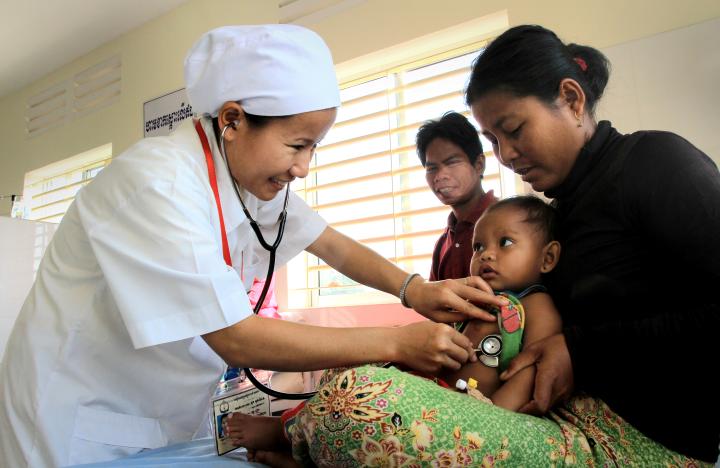
Chhor Sokunthea/ World Bank
As fear and uncertainty grow around the escalating COVID-19 pandemic, we need global solidarity more than ever.
Since March 2020, the international development banks rapidly started to respond to the global health crisis by increasing their COVID-19 related financing availability and fast-track financing packages to fight the impacts of the pandemic.
International development projects have been supporting the global humanitarian response to the COVID-19 pandemic by providing assistance, training, and essential resources to those who provide life-saving support to others – the world's real-life heroes. See here for a roundup of the latest highlights from Multilateral Development Banks, the United Nations, and other International Organisations in response to the humanitarian and socio-economic impacts of the COVID-19 pandemic.
Learn more about International Development & COVID-19 »
Projects in Health and Medical Sector
Cambodia | Securing Children's Future
Cambodia has made great strides in health care. Maternal and child mortality have been vastly reduced and more healthcare facilities are now available throughout the country.
The picture was very different 20 years ago when gaining access to affordable health services were huge obstacles for the poorest and most remote villages.
With support from the World Bank and the Health Equity Fund, people living in rural areas can now get the modern medicine they need without traveling far or trying to come up with money they don’t have.
Rwanda | Using Drones to Deliver Blood and Save Lives
Launched in October 2016, the drone delivery project made Rwanda the first country in the world to use drone technology for the purpose of saving lives. The drone delivery project is a partnership between the Government of Rwanda and the California-based robotics company, Zipline Inc.
With the help of drones, it no longer takes hours for blood to get to remote clinics and hospitals. Life-saving blood transfusions can now be received by those in need in a matter of minutes.
Currently, the program is focused almost exclusively on blood deliveries. However, the project aims to expand its service to the deliveries of vaccines and essential medicines for the treatment of diseases such as HIV/AIDS, malaria, and tuberculosis.
Papua New Guinea | Expanding Access to Health Care
Despite a period of high economic growth in recent years, averaging 6% annually from 2006–2015, Papua New Guinea (PNG) failed to achieve its targets for the Millennium Development Goals on maternal and child health. Life expectancy in the country relative to income is low at 65 years and the estimated burden of disease is dominated by chronic diseases.
PNG’s poor health outcomes are the result of deteriorating healthcare services caused by volatile and unpredictable health financing, as well as weaknesses in government health systems and in health sector capacities.
The Health Services Sector Development Program, funded by the Asian Development Bank, works towards the implementation of an integrated public health model that links primary and secondary health facilities in rural areas to improve patient health outcomes. In addition, it aims to decentralize health service delivery by focusing on capacity building of staff at the sub-national level in public financial management and reporting.
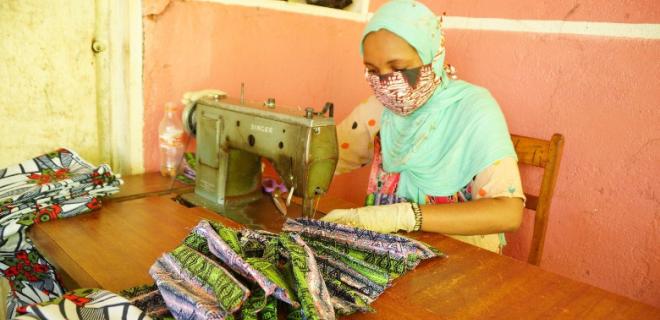
Amal Souleymane, a seamstress by training, was recruited in June by the COMMODE sewing workshop in the capital of Bangui works tirelessly behind her sewing machine in making masks.
A Lifesaver in Times of COVID-19 – Face Masks Made in Post-Conflict Central African Republic
WORLD BANK | LONDO PROJECT
Just a couple of months ago in the Central African Republic, most citizens and healthcare workers were struggling in getting protective masks as the country was confronted with the spread of coronavirus cases.
In countries where social distancing and confinement are difficult to impose, masks are an essential element of the response. Extraordinary times required an extraordinary solution. Ten million masks needed to be locally produced with standards respecting World Health Organization (WHO) guidelines. In record time, the World Bank supported LONDO project ("Stand-Up" in Sango) – currently the largest cash-for-work program in the country – was able to produce more than 2.4 million masks so far.
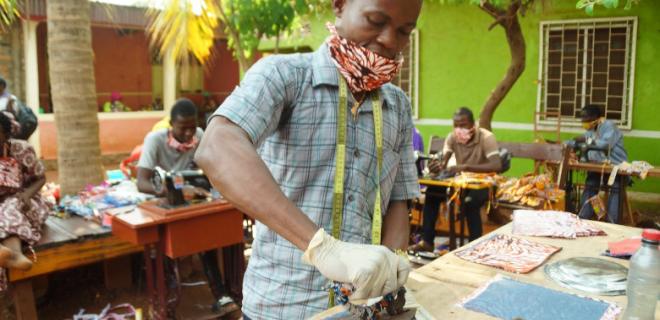
Danoe Benjamin, a young tailor helper from the town of Bégoua, is ironing the different pieces of fabric to give them the right shape.
“The [Central African Republic] Minister of Health Pierre Somsé asked for the World Bank assistance in sourcing 10 million masks that could not be found on the international market. We had to find an innovative approach and we turned to the LONDO project and our partners,” shared Han Fraeters, World Bank Country Manager for the Central African Republic. “What started as a health response with a focus on saving lives by delivering protective masks, also became a response to the economic impact by providing livelihoods to 18,000 tailors who have been recruited and to 300 local firms that have been contracted through the project.”
Souleymane is a single mother of four children whose husband was killed walking home from work two years ago by a stray bullet. ‘‘This seed that they have sown in my life is germinating and will mature durably and invariably,’’ said Amal with a smile. With the money she earned, she started to repair part of her makeshift house where she lives with her children. She plans to use the rest of her savings to open her own sewing workshop one day.
For Benjamin, what attracted him to the job was the urge of being useful and helping the collective efforts against the COVID-19 pandemic. He is now making a good living each week. Coming from a family of 13 children, he dropped out of school in class 3. Without a proper education and without a job, he was left by himself and had started joining a group of young people who engaged in uncivil activities. In the Central African Republic, a large proportion of young people are very vulnerable due to lack of training and jobs. Many get recruited into armed groups and turn to violence.
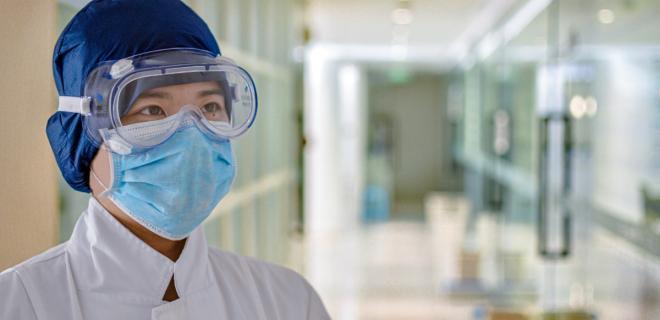
Asia is home to some of the world’s top producers of personal protective equipment for medical personnel.
The World Health Organization (WHO) estimates that 89 million medical masks, 76 million examination gloves, and 1.6 million protective goggles are required for COVID-19 response each month.
Supporting the Supply Lines that Keep Health Workers Safe from COVID-19
ASIAN DEVELOPMENT BANK
The world faces an acute shortage of Personal Protective Equipment (PPE) as the COVID-19 pandemic spreads. Shortages of medical masks, protective suits, goggles, and gloves are putting the lives of frontline healthcare workers at risk.
The production processes and supply chains that feed into the production of masks, gloves, and other PPE need to be secured to provide the essential support that our frontliners need.
Managing the current supply chain to meet the surging demand is challenging. Many producers have already exceeded their surge capacity. Major disruptions to global supply chains and logistics due to stringent containment measures are also impeding output.
To secure supply lines, the Asian Development Bank (ADB) is focusing its work on strengthening their collaboration with regional economies with established global mechanisms like the Pandemic Supply Chain Network coordinated by the WHO. As countries and regions face different infection curves at different times, efficient resource allocation on a global scale helps support individual countries by minimizing strains on limited domestic resources.
Frontline health workers need more masks, gloves, and other vital equipment to protect themselves as they save lives. For this to happen, the production process and the vital supply chains that feed into the production of PPEs must be secured.
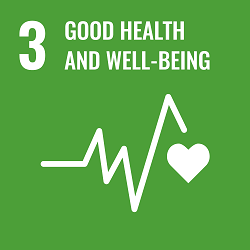
Sustainable Development Goals
Goal 3: Good Health and Well Being at all ages is essential to sustainable development. It is at the forefront more than ever as the world continued to fight the COVID-19 pandemic.
International development projects foster better health systems, improve sanitation and hygiene, and increase access to health coverage.
UNDB facilitates global health and well being by supporting and encouraging investment in countries’ efforts to achieve universal health coverage, and provide quality and affordable health services to everyone.


